EU vaccine export talks: is the UK being targeted?
The EU’s proposed new export rules could affect vaccine supply to the UK

A free daily email with the biggest news stories of the day – and the best features from TheWeek.com
You are now subscribed
Your newsletter sign-up was successful
EU leaders are holding virtual talks today to discuss how to boost Covid vaccine supplies across the bloc, including new measures that could affect supply to the UK.
The European Commission proposed controversial new rules on Wednesday that would allow the EU to severely curtail the export of vaccines to places such as the UK and the US for up to six weeks. These are “countries that are either receiving EU-made vaccines but not sending other shots back, or that have vaccinated more of their population than the EU”, said Politico Europe.
What have EU leaders said?
The Week
Escape your echo chamber. Get the facts behind the news, plus analysis from multiple perspectives.

Sign up for The Week's Free Newsletters
From our morning news briefing to a weekly Good News Newsletter, get the best of The Week delivered directly to your inbox.
From our morning news briefing to a weekly Good News Newsletter, get the best of The Week delivered directly to your inbox.
As the plans were unveiled by the Commission on Wednesday, Boris Johnson warned that pharmaceutical giants could be tempted to take their business to Britain if the EU were to ban vaccine exports to countries like the UK.
Speaking to a parliamentary liaison committee, Johnson said “the long-term damage done by blockades can be very considerable” and said drug companies “may look at such actions and draw conclusions about whether or not it is sensible to make future investments” in countries that imposed blockades.
An ease in tensions seemed to come last night as both the UK and the EU issued a joint statement vowing to cooperate on vaccine supplies. The two former trading partners said they were committed to working on steps to create a “win-win situation and expand vaccine supply for all our citizens”.
"We have been discussing what more we can do to ensure a reciprocally beneficial relationship between the UK and EU on Covid-19”, said the statement.
A free daily email with the biggest news stories of the day – and the best features from TheWeek.com
The EU has complained for weeks about the “reciprocity” of vaccine exports, with European Commissioner Ursula von der Leyen warning last week that the EU was willing to use “whatever tool we need” to ensure the EU receives its fair share.
The EU has certainly exported far more vaccines than it has received, sending 34 million vaccines to countries across the world, and ten million to the UK alone – but receiving none in return.
The statement was “a bit wishy-washy and didn’t really say anything concrete”, said London Playbook. adding that “it does seem a step in the right direction away from the rhetoric of the last few days”.
Is the UK being targeted?
Under the proposals being considered by the EU, a key criterion for blocking vaccine exports is “whether the country of destination of the export restricts its own exports [of vaccines to the EU]…or of the raw materials from which they are made, either by law or by any other means”.
This rule seems to target the UK – the EU argues that while we may not have an “official” export ban, the UK’s arrangements with AstraZeneca, which require the company to prioritise the country before all others, works as a de facto export ban.
As the EU’s new proposals were outlined, EU trade commissioner Valdis Dombrovskis gave the UK as an example of a country that will be particularly affected by the rules, reports The Telegraph.
Many EU leaders have expressed strong feelings that the UK is engaging in “vaccine nationalism”, including the EU’s internal market commissioner Thierry Breton.
“We have a feeling that the vaccine nationalism is really on the other side of the Channel,” he told the Financial Times. “We are not seeing any vaccines in the UK arriving here.”
Health secretary Matt Hancock argues the UK simply has the better agreement with AstraZeneca. The EU has “a ‘best efforts’ contract and we have an exclusivity deal”, he told The Times.
“Our contract trumps theirs. It’s called contract law – it’s very straightforward,” he added.
“EU insiders say they had hoped never to use the controls,” reports the BBC’s Katya Adler. Instead, they plan to use the proposed measures as a “means of exerting pressure on vaccine companies and on countries with vaccine production sites that are not exporting to the EU.”
Sorcha Bradley is a writer at The Week and a regular on “The Week Unwrapped” podcast. She worked at The Week magazine for a year and a half before taking up her current role with the digital team, where she mostly covers UK current affairs and politics. Before joining The Week, Sorcha worked at slow-news start-up Tortoise Media. She has also written for Sky News, The Sunday Times, the London Evening Standard and Grazia magazine, among other publications. She has a master’s in newspaper journalism from City, University of London, where she specialised in political journalism.